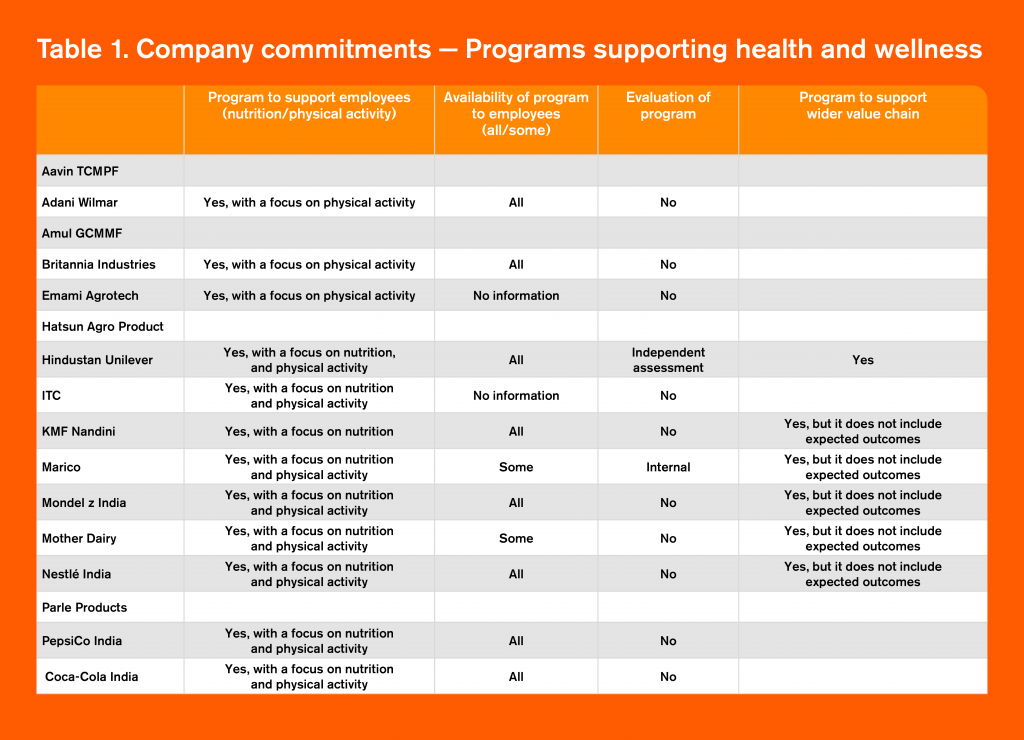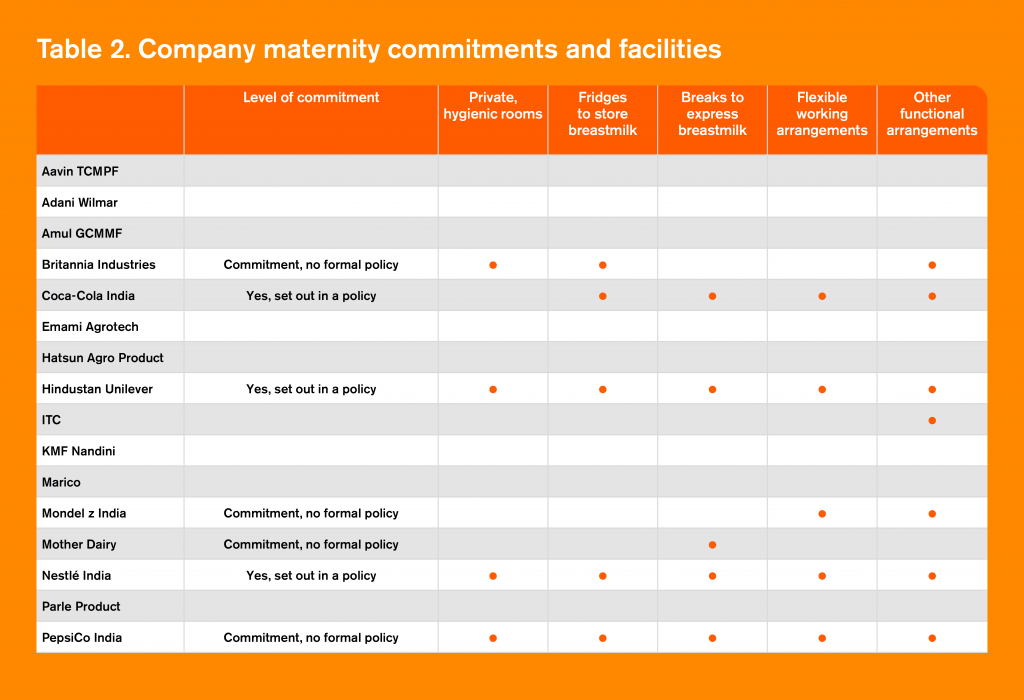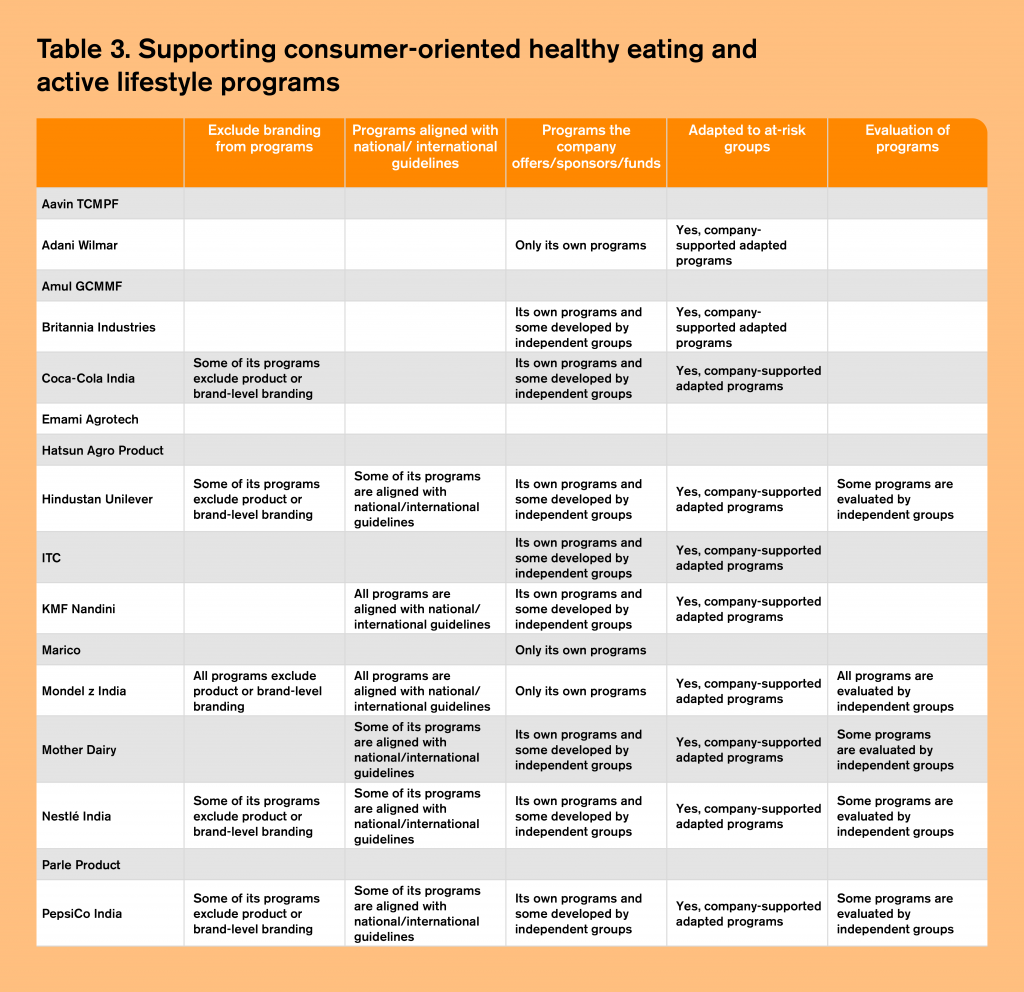Category E: Lifestyles
Supporting healthy lifestyles among employees and consumers (2.5% of overall score)
Category E consists of three criteria, each of which are weighted equally:
-
E1
Supporting employee health and wellness
-
E2
Supporting breastfeeding mothers at work
-
E3
Supporting consumer-oriented healthy eating and active lifestyle programs
- Have programs that support employee health and wellbeing, with a focus on nutrition and physical activity and which are open to all employees and address workers across the food supply chain.
- Disclose quantitative and/or qualitative outcomes of independent impact analysis of its health and wellness programs.
- Have maternity policies which respect and go beyond current Indian regulations,including paid leave and flexible working arrangements, as well as appropriate workplace facilities for all breastfeeding mothers when they return to work.
- A commitment to support unbranded, evidence-based and consumer-oriented programs on nutrition literacy and education, healthy eating and active lifestyles, developed and implemented by independent organizations with relevant expertise.
Context
Employee Health
Within the Indian Food Industry, employees spend approximately a third of their day at work, with long or irregular working hours, unpredictable shifts alongside frequent travel and as a result they often adopt unhealthy food habits, sedentary lifestyles or show signs of work stress. The National Health Policy 2017 of India, emphasises “preventive and promotive health care” (i.e., helping people to increase control over and improve their health), to reduce stress and improve safety at work since the workplace offers an ideal setting to promote employee health.
Initiatives such as the Ethical Tea Partnership with partners like the Sustainable Trade Initiative (IDH), UNICEF and Hindustan Unilever (HUL) have set common goals for tea estate workers in Assam state in North-Eastern India (famous for its tea) that include:
- Workers, their families and communities have increased access to high-quality healthcare.
- Tea estate workers, their families and communities have access to food that meets their nutritional needs.
- Female workers have better access to equal employment opportunities and maternity benefits that protect the health and development of themselves and their children, enabling them to achieve a decent standard of living.
- Lactating women are better able to breastfeed in safe spaces without being penalised for taking time out of the working day
Indian Maternity Policies
Under the Indian Maternity Benefit (Amendment) Act 2017, maternity leave was raised from the previous 12 weeks to the current duration of 26 weeks. Prenatal leave was also extended from six to eight weeks.
A woman with two or more children is entitled to 12 weeks’ maternity leave and the prenatal leave in this case remains at six weeks. The Act further requires an employer to inform a woman worker of her rights under the Act at the time of her appointment. The information must be given in writing and in an electronic form to ensure that the rights of the employee are clearly presented to them.
The current Indian regulations on maternity leave are comprehensive when compared to other countries. For example, the US does not offer national statutory paid maternity, paternity or parental leave. The US Family and Medical Leave Act enables some employees to take up to 12 weeks unpaid maternity leave but only 60% of workers are eligible.
Consumer Health
Nutrition literacy within the Indian context is currently underdeveloped. The National Nutrition Strategy (NNS) of India follows the rationale that investing in nutrition is globally well recognized as a critical development stage and it is crucial for the fulfillment of human rights — especially for the most vulnerable children, girls, and women. Nutrition literacy constitutes the foundation for human development by reducing susceptibility to infection and related morbidity, disability and mortality and enhancing productivity. Nutrition is acknowledged as one of the most effective entry points for human development, poverty reduction and economic development, with high economic returns. High levels of maternal and child undernutrition in India have persisted, despite strong constitutional and legislative commitments by government.
How are healthy diets and active lifestyles linked to the COVID-19 crisis?
- Indian companies must work to ensure the health and safety of their employees during the COVID-19 crisis. As demands for products and services have not diminished during the current outbreak, many companies have had to continue to operate at normal levels, which means that employees need sufficient protection to enable them to do their jobs without being put at risk. Following national and international guidelines is key. The Food Safety and Standards Authority of India FSSAI has issued guidance in three areas: i) maintaining high levels of personal hygiene, ii) practicing social distancing, and; iii) cleaning and sanitation (FSSAI, 2020). More detail is set out within the referenced FSSAI document.
- Companies need to adopt COVID-19 strategies to mitigate employee risk in addition to job loss prevention within the company and in the value chain. This at minimum would mean ensuring that employees are compensated appropriately for their work and suppliers for their services, and that support to breastfeeding mothers is protected. An illustration of an appropriate approach in action would be Nestlé India’s policy in which the company has adopted stringent social distancing measures within its production facilities. It has also rolled out a program that will reward each operator for working during a stipulated period.
- Adopting or extending breastfeeding policies for their workers is another way companies can respond to COVID-19 (WHO, 2020). UNICEF has provided a ‘Breastfeeding During COVID’ document which provides guidelines on preventing breastfeeding disruption, in addition to necessary precautions and considerations that must be taken before, during, and after the crisis (UNICEF, 2020). Improving facilities to support breastfeeding mothers would be one way in which companies can help protect the health mothers and their infants.
The India Spotlight Index 2020 research did not include indicators to score and rank companies’ responses to the COVID-19. But ATNI did talk to companies about their initial coping strategies and responses to the pandemic between March and June 2020 and ATNI has been tracking publicly available information on industry’s response globally to the COVID-19 crisis, including in India, and reported on trends, best practices and areas of concern in separate reports. Read more about how companies can positively contribute to addressing the global nutrition challenges in ATNI’s COVID-19 Project.
ATNI Covid-19 ProjectMain messages
- Most companies (twelve out of sixteen) make a commitment to improve the health and wellness of their employees with programs designed to address physical health and nutrition. While most of these programs (ten out of twelve) are accessible to all employees, only six companies demonstrated a commitment to improving the health and wellness of groups across the wider food supply chain and not direct employees. In addition, most companies do not seem to monitor the impact of their health and wellness programs. Hindustan Unilever bucks this trend by conducting independent evaluations to capture this information and goes a step further by monitoring the impact of programs relevant to employees across the food supply chain.
- In respect to increasing nutrition literacy, nutrition education, healthy diet-oriented and active lifestyle programs aimed at groups that experience, or are at high risk of experiencing, malnutrition, eight companies publicly commit to sponsor/fund such programs. Mondelēz India is the only company to demonstrate that all of its nutrition and health programs exclude product promotion or branding.
- Seven of the companies have a public commitment to support breastfeeding mothers with appropriate working conditions and facilities beyond legal requirements. Half of the overall companies provide at least some facilities to support working mothers. This support is though access to private rooms, flexible work hours etc., without a formal commitment to doing so (support is on an ad hoc basis).
- Three of the sixteen companies make formal commitments to supporting breastfeeding mothers at work. Coca-Cola India, Hindustan Unilever and Nestlé India have set out their commitment in a formal policy.
- Companies without formal commitments refer to less defined “other functional arrangements’’ to support breastfeeding mothers. Examples of these functional arrangements can be travel subsidies, creche access or alteration of workload.
Novelties and best practices
HUL Health & Wellness Strategy
The Hindustan Unilever’s Health & Wellbeing strategy has been enhanced since 2016 and forms the cornerstone of the company’s approach to supporting healthier diets and lifestyles for its customers, employees and throughout the wider value chain. Through the program, the company has worked to double the amount of products that meet their ‘highest nutritional standards’ (reducing salt, sugar and fat). Support throughout the wider value chain is provided by programs such as ‘Seeds of Prosperity’, which aims to improve the dietary diversity of smallholder farmers and also improve their hygiene facilities. The Hindustan Unilever Lamplighter Program helps employees to improve their diet/nutritional intake and lifestyles for improved health. Other facets aim to change habits by measuring the direct impacts of calorie intake and water intake, for example, in addition to measuring other impacts like employees’ body mass index and blood pressure.
KMF Nandini’s employee support approach
KMF Nandini focuses on the nutrition of all employees by distributing up to 1 L per day of free milk to all employees. It also helps employees to get periodic health checks and cardiologist consultations through its annual medical camps.
PepsiCo India’s 2025 Agenda
The employee element of PepsiCo India’s 2025 Agenda is designed to drive fair and safe working conditions throughout the value chain and address the most salient human rights issues (i.e., freedom of association, human right to water, land rights, vulnerable worker groups, working hours and wages, and workplace safety). PepsiCo India offers policies like 12 weeks of paternity leave, childcare policy, MatCare4U Program (which regularly sends women information on maternity issues), in addition to a multitude of flexible options to accommodate the needs of breastfeeding mothers at work. PepsiCo India also has the ambitious intention to extend the principles of the Supplier Code of Conduct to all franchises and joint ventures by 2025. The Code of Conduct is a 16-point document to ensure that those in the PepsiCo India supply chain uphold the company’s expectations in areas of labor practices, health and safety.
E1 Supporting employee health and wellness
- Since the previous India Index in 2016, the number of company commitments to support health and wellness has increased. Whereas in 2016, five of the nine companies assessed had a program designed to address health and wellness, 12 of the 16 companies of the 2020 Index now have a program.
- Hindustan Unilever performs the best in E1, followed by Marico and PepsiCo India. All three companies offer a comprehensive and accessible employee health and wellness program that includes nutrition components. Programs such as the Hindustan Unilever’s Lamplighter program include expected outcomes for employees who participate, whereas Marico focusses on four areas of employee wellness (emotional, community, financial and health), and PepsiCo India’s 2025 Agenda is comprehensive in its support for employees with an emphasis on flexible employee working hours (to allow a better work-life balance) and safety within the workplace.
- Despite 12 of the 16 companies in this Index having a program in place designed to address health and wellness issues, most companies still do not commission proper independent assessments of the effectiveness of these programs.
- In criterion E1, the company that has improved the most since the previous index is Mother Dairy. The improvement can be attributed to the company’s development of programs like ‘Sahi Poshan Swasth Jeevan’ (right nutrition, healthy life) described in the best practices section above.
- Most companies have improved their E1 score since 2016; only two companies (Amul GCMMF and Parle Products) have not. In both the 2016 and 2020 iterations, neither Amul GCMMF nor Parle Productshave reported on this topic.
Recommendations
To improve and accelerate their efforts to support healthy diets and active lifestyles among employees, food and beverage manufacturers in India are encouraged to:
- To increase their emphasis on improving the accessibility of their health and wellness programs, particularly on nutrition and physical activity elements that are accessible to all
- Implement robust impact assessment tools and monitoring mechanisms for employee health and wellness programs.

E2 Supporting breastfeeding mothers at work
- Seven of the sixteen companies make a commitment or have a formal policy to support breastfeeding mothers with appropriate working conditions and facilities at work (that respect and go beyond Indian regulations), compared to five out of nine companies in the previous Index.
- Of the companies that have a commitment or a formal policy, five provide flexible working hours to support breastfeeding mothers (Coca-Cola India, Hindustan Unilever, Mondelēz India, Nestlé India and PepsiCo India), and four provide private, hygienic rooms for expressing breastmilk (Britannia Industries, Hindustan Unilever, Nestlé India and PepsiCo India) All companies have some form of support to breastfeeding mothers.
- The highest scoring companies on E2 are Hindustan Unilever and Nestlé India. Both companies have a comprehensive approach which provide working mothers with a variety of options to support them at work (such as fridges to store breastmilk, breaks in which to express milk, flexible working arrangements etc.), which are amongst the best practices in this area.
- PepsiCo India and Coca-Cola India are the third and fourth-placed companies, respectively. PepsiCo India is performing well with an extensive provision of facilities to support breastfeeding mothers, which was also acknowledged with the “Best in Benefits for Working Parents award” (from ‘People Matters’) in 2019.
Recommendation
To improve and accelerate their efforts to support breastfeeding mothers at work, food and beverage manufacturers in India are encouraged to:
- Increase transparency about the support extended to breastfeeding mothers at work and support to maternal health, within a formal company policy which is in line with, or ideally, goes beyond, Indian regulations. If more companies would formalise a commitment to support breastfeeding, this would provide women in the workplace with greater security
- Currently limited arrangements to support breastfeeding mothers should be expanded to: i) provide private, hygienic, safe rooms for expressing breastmilk; ii) allow breastfeeding mothers breaks to express breastmilk, and; iii) offer flexible working arrangements to support breastfeeding mothers.

E3 Supporting consumer-oriented healthy eating and active lifestyle programs
- Since the previous India Index in 2016, where five of the assessed companies (Britannia Industries, Mondelēz India, Mother Dairy, Nestlé India and PepsiCo India) committed to supporting consumer-orientated nutrition education and healthy diet programs, no additional companies have adopted such programmes. The number remains at five but two of the companies have changed and the programs are now offered by Coca-Cola India, Hindustan Unilever, Mondelēz India, Nestlé India and PepsiCo India.
- Eleven companies have some form of nutrition education/nutrition literacy/healthy diet-oriented/active lifestyle programs aimed at the general population/consumers. These programs are adapted to meet the specific needs, background and nutrition literacy level of groups that experience or are at high risk of experiencing malnutrition. Of the eleven companies, eight have their own company program in addition to programs developed and implemented by independent groups. Five companies haven’t publicly indicated to hosting any such programs, which are Emami Agrotech, Hatsun Agro Product, Marico, Parle Products and Aavin TCMPF.
- One of the most significant findings on consumer health approaches is the limited evaluation of the outcomes of company programs, with only five companies commissioning any evaluations by independent groups (i.e. third-party evaluation). Mondelēz India is the only company to have commissioned evaluations for all programs by independent groups with relevant expertise. This was also the case for Mondelēz India in the 2016 Index.
Recommendations
To improve and accelerate their efforts to support healthy diets and active lifestyles among consumers, food and beverage manufacturers in India are encouraged to:
- Expand the coverage of health and wellness programs to include more of those in the food supply chain that are not direct employees. Companies assessed within the Index demonstrated a limited commitment to supporting the health and wellness of people across their food supply chain beyond direct employees.
